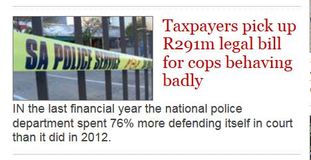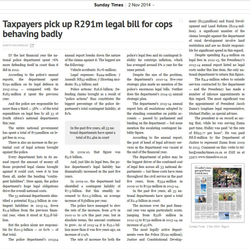NEWS DESK
Residents of Industry House and Others v Minister of Police and Others
('Raids case')
Police raids - constitutionality of section 13(7) of the SAPS Act - search without a warrant - South Gauteng High Court.
SERI represents the residents of 11 buildings in inner-city Johannesburg who are challenging the lawfulness and constitutionality of over 20 police raids conducted at the behest of the Minister of Police and the Mayor of the City of Johannesburg, Herman Mashaba, between 30 June 2017 and 3 May 2018.
The majority of the 20 raids were authorised in terms of section 13(7) of the South African Police Services Act 68 of 1995, which empowers the police to “cordon-off” an area to “restore public order or ensure the safety of the public”, while two were conducted without any legal authorisation at all. The residents challenge the constitutionality of section 13(7) insofar as it allows for a person’s home to be searched without a warrant issued by a court. The residents also claim compensation for the breach of their rights to privacy and human dignity.
During the raids, which were jointly conducted by the South African Police Services (SAPS), the Johannesburg Metropolitan Police Department (JMPD), the Department of Home Affairs and the City of Johannesburg, officials forced residents out of the buildings and onto the streets (often in the middle of the night while residents were only partially clothed), where they were searched, finger-printed and commanded to produce copies of their identity documents, passports or asylum seekers’ permits. Anyone who was unable to produce their identity documents was detained.
Some South African citizens who could not produce their identity documents were arrested because, according to one official, they “looked too dark” to be South African. Most of those that were arrested were never charged and released after a day or two Inside the buildings, the police often left the residents’ homes in disarray by breaking down doors and partitions, damaging furniture and even stealing valuable items and small amounts of cash.
The matter was heard before a full Bench of the South Gauteng High Court on 16 March 2020. On 29 June 2020, the full bench of the High Court in Johannesburg delivered a judgment declaring section 13 (7) (c) of the SAPS Act constitutionally invalid.
Residents of Industry House, 5 Davies Street, New Doornfontein, Johannesburg and Others v Minister of Police and Others (18205/2018) [2020] ZAGPJHC
29 June 2020
Case Summary: Search and seizure - Without warrant - including private homes in an area cordoned off on the authority of a national or provincial commissioner of police with the object of restoring public order or to ensure the safety of the public in the particular area – Provision infringing constitutionally entrenched right to privacy – Section 13(7) (c) of the SAPS Act is overbroad and therefore unconstitutional - Declaration of unconstitutionality suspended to afford legislature time to cure invalidity – Reading-in to regulate interim situation - South Africa Police Services Act 68 of 1995 (the SAPS Act), s 13(7).
Review - Promotion of Administrative Justice Act 2 of 2000 (PAJA) – Decisions of the then acting provincial commissioner and of the former provincial commissioner to issue authorisations in terms of s 13(7) of the SAPS Act in respect of particular areas in the inner city of Johannesburg during the period 27 June 2017 to 3 May 2018, reviewed and set aside under PAJA.
Ancillary declaratory relief granted
Read the judgment
('Raids case')
Police raids - constitutionality of section 13(7) of the SAPS Act - search without a warrant - South Gauteng High Court.
SERI represents the residents of 11 buildings in inner-city Johannesburg who are challenging the lawfulness and constitutionality of over 20 police raids conducted at the behest of the Minister of Police and the Mayor of the City of Johannesburg, Herman Mashaba, between 30 June 2017 and 3 May 2018.
The majority of the 20 raids were authorised in terms of section 13(7) of the South African Police Services Act 68 of 1995, which empowers the police to “cordon-off” an area to “restore public order or ensure the safety of the public”, while two were conducted without any legal authorisation at all. The residents challenge the constitutionality of section 13(7) insofar as it allows for a person’s home to be searched without a warrant issued by a court. The residents also claim compensation for the breach of their rights to privacy and human dignity.
During the raids, which were jointly conducted by the South African Police Services (SAPS), the Johannesburg Metropolitan Police Department (JMPD), the Department of Home Affairs and the City of Johannesburg, officials forced residents out of the buildings and onto the streets (often in the middle of the night while residents were only partially clothed), where they were searched, finger-printed and commanded to produce copies of their identity documents, passports or asylum seekers’ permits. Anyone who was unable to produce their identity documents was detained.
Some South African citizens who could not produce their identity documents were arrested because, according to one official, they “looked too dark” to be South African. Most of those that were arrested were never charged and released after a day or two Inside the buildings, the police often left the residents’ homes in disarray by breaking down doors and partitions, damaging furniture and even stealing valuable items and small amounts of cash.
The matter was heard before a full Bench of the South Gauteng High Court on 16 March 2020. On 29 June 2020, the full bench of the High Court in Johannesburg delivered a judgment declaring section 13 (7) (c) of the SAPS Act constitutionally invalid.
- High Court Judgment (29 June 2020) here.
- Lawyers For Human Rights Amicus Curiae Heads of Argument (27 January 2020) here.
- Legal Aid SA's Amicus Curiae Heads of Argument (27 January 2020) here.
- Respondents' Answering Affidavit (31 January 2019) here.
- Residents' Heads of Argument (13 December 2019) here.
- SERI Press Statement (24 May 2018) here.
- Residents’ Notice of Motion and Founding Affidavit (11 May 2018) here and here.
Residents of Industry House, 5 Davies Street, New Doornfontein, Johannesburg and Others v Minister of Police and Others (18205/2018) [2020] ZAGPJHC
29 June 2020
Case Summary: Search and seizure - Without warrant - including private homes in an area cordoned off on the authority of a national or provincial commissioner of police with the object of restoring public order or to ensure the safety of the public in the particular area – Provision infringing constitutionally entrenched right to privacy – Section 13(7) (c) of the SAPS Act is overbroad and therefore unconstitutional - Declaration of unconstitutionality suspended to afford legislature time to cure invalidity – Reading-in to regulate interim situation - South Africa Police Services Act 68 of 1995 (the SAPS Act), s 13(7).
Review - Promotion of Administrative Justice Act 2 of 2000 (PAJA) – Decisions of the then acting provincial commissioner and of the former provincial commissioner to issue authorisations in terms of s 13(7) of the SAPS Act in respect of particular areas in the inner city of Johannesburg during the period 27 June 2017 to 3 May 2018, reviewed and set aside under PAJA.
Ancillary declaratory relief granted
Read the judgment
LOCKDOWN REGULATIONS UNCONSTITUTIONAL
Lockdown regulations promulgated by the Minister of Cooperative Governance and Traditional Affairs Nkosazana Dlamini-Zuma have been condemned by the Gauteng High Court; so much so, that the laws have been deemed “unconstitutional and invalid”.
2 June 2020
𝙏𝙝𝙚 𝙘𝙤𝙪𝙧𝙩 𝙝𝙖𝙨 𝙙𝙚𝙘𝙡𝙖𝙧𝙚𝙙 𝙩𝙝𝙚 𝙇𝙚𝙫𝙚𝙡 3 𝙖𝙣𝙙 𝙇𝙚𝙫𝙚𝙡 4 𝙡𝙤𝙘𝙠𝙙𝙤𝙬𝙣 𝙧𝙚𝙜𝙪𝙡𝙖𝙩𝙞𝙤𝙣𝙨 𝙩𝙤 𝙗𝙚 𝙪𝙣𝙘𝙤𝙣𝙨𝙩𝙞𝙩𝙪𝙩𝙞𝙤𝙣𝙖𝙡 𝙖𝙣𝙙 𝙞𝙣𝙫𝙖𝙡𝙞𝙙.
The High Court in Pretoria ruled today that the Minister of Cooperative Governance and Traditional Affairs Nkosazana Dlamini-Zuma has 14 days to formulate changes to the regulations. In the meantime, the current lockdown regulations will still apply.
The judgment said the regulations "in a substantial number of instances are not rationally connected to the objectives of slowing the rate of infection or limiting the spread" of Covid-19.
𝑻𝒉𝒆 𝒋𝒖𝒅𝒈𝒎𝒆𝒏𝒕 𝒔𝒂𝒊𝒅 𝒕𝒉𝒆 𝒈𝒐𝒗𝒆𝒓𝒏𝒎𝒆𝒏𝒕 𝒉𝒂𝒔 𝒏𝒐𝒕 𝒑𝒓𝒐𝒅𝒖𝒄𝒆𝒅 𝒂𝒏𝒚 𝒃𝒐𝒏𝒂 𝒇𝒊𝒅𝒆 𝒆𝒗𝒊𝒅𝒆𝒏𝒄𝒆 𝒕𝒉𝒂𝒕 𝒊𝒕𝒔 𝒎𝒆𝒂𝒏𝒔 𝒐𝒇 𝒆𝒏𝒇𝒐𝒓𝒄𝒊𝒏𝒈 𝒕𝒉𝒆 𝒍𝒐𝒄𝒌𝒅𝒐𝒘𝒏 𝒂𝒓𝒆 "𝒋𝒖𝒔𝒕𝒊𝒇𝒊𝒂𝒃𝒍𝒆", 𝒂𝒏𝒅 𝒕𝒉𝒆𝒚 𝒄𝒂𝒏 𝒕𝒉𝒆𝒓𝒆𝒇𝒐𝒓𝒆 𝒃𝒆 𝒅𝒆𝒆𝒎𝒆𝒅 𝒂𝒓𝒃𝒊𝒕𝒓𝒂𝒓𝒚 𝒂𝒏𝒅 𝒖𝒏𝒍𝒂𝒘𝒇𝒖𝒍.
The lockdown regulations go against rights enshrined in the Bill of Rights, the judgment says.
𝗧𝗵𝗲 𝗮𝗽𝗽𝗹𝗶𝗰𝗮𝘁𝗶𝗼𝗻 𝘄𝗮𝘀 𝗯𝗿𝗼𝘂𝗴𝗵𝘁 𝗯𝘆 𝘁𝗵𝗲 𝗟𝗶𝗯𝗲𝗿𝘁𝘆 𝗙𝗶𝗴𝗵𝘁𝗲𝗿𝘀 𝗡𝗲𝘁𝘄𝗼𝗿𝗸, 𝘁𝗵𝗲 𝗛𝗼𝗹𝗮 𝗕𝗼𝗻𝗮 𝗥𝗲𝗻𝗮𝗶𝘀𝘀𝗮𝗻𝗰𝗲 𝗙𝗼𝘂𝗻𝗱𝗮𝘁𝗶𝗼𝗻 𝗮𝗻𝗱 𝗮𝘁𝘁𝗼𝗿𝗻𝗲𝘆 𝗥𝗲𝘆𝗻𝗼 𝗱𝗲 𝗕𝗲𝗲𝗿.
The court did find that the regulations relating to education, prohibitions against evictions, initiation practices and the closure of night clubs, fitness centres and borders all appear to be rationally connected to the stated objectives.
𝙏𝙝𝙚 𝙘𝙤𝙪𝙧𝙩 𝙝𝙖𝙨 𝙙𝙚𝙘𝙡𝙖𝙧𝙚𝙙 𝙩𝙝𝙚 𝙇𝙚𝙫𝙚𝙡 3 𝙖𝙣𝙙 𝙇𝙚𝙫𝙚𝙡 4 𝙡𝙤𝙘𝙠𝙙𝙤𝙬𝙣 𝙧𝙚𝙜𝙪𝙡𝙖𝙩𝙞𝙤𝙣𝙨 𝙩𝙤 𝙗𝙚 𝙪𝙣𝙘𝙤𝙣𝙨𝙩𝙞𝙩𝙪𝙩𝙞𝙤𝙣𝙖𝙡 𝙖𝙣𝙙 𝙞𝙣𝙫𝙖𝙡𝙞𝙙.
The High Court in Pretoria ruled today that the Minister of Cooperative Governance and Traditional Affairs Nkosazana Dlamini-Zuma has 14 days to formulate changes to the regulations. In the meantime, the current lockdown regulations will still apply.
The judgment said the regulations "in a substantial number of instances are not rationally connected to the objectives of slowing the rate of infection or limiting the spread" of Covid-19.
𝑻𝒉𝒆 𝒋𝒖𝒅𝒈𝒎𝒆𝒏𝒕 𝒔𝒂𝒊𝒅 𝒕𝒉𝒆 𝒈𝒐𝒗𝒆𝒓𝒏𝒎𝒆𝒏𝒕 𝒉𝒂𝒔 𝒏𝒐𝒕 𝒑𝒓𝒐𝒅𝒖𝒄𝒆𝒅 𝒂𝒏𝒚 𝒃𝒐𝒏𝒂 𝒇𝒊𝒅𝒆 𝒆𝒗𝒊𝒅𝒆𝒏𝒄𝒆 𝒕𝒉𝒂𝒕 𝒊𝒕𝒔 𝒎𝒆𝒂𝒏𝒔 𝒐𝒇 𝒆𝒏𝒇𝒐𝒓𝒄𝒊𝒏𝒈 𝒕𝒉𝒆 𝒍𝒐𝒄𝒌𝒅𝒐𝒘𝒏 𝒂𝒓𝒆 "𝒋𝒖𝒔𝒕𝒊𝒇𝒊𝒂𝒃𝒍𝒆", 𝒂𝒏𝒅 𝒕𝒉𝒆𝒚 𝒄𝒂𝒏 𝒕𝒉𝒆𝒓𝒆𝒇𝒐𝒓𝒆 𝒃𝒆 𝒅𝒆𝒆𝒎𝒆𝒅 𝒂𝒓𝒃𝒊𝒕𝒓𝒂𝒓𝒚 𝒂𝒏𝒅 𝒖𝒏𝒍𝒂𝒘𝒇𝒖𝒍.
The lockdown regulations go against rights enshrined in the Bill of Rights, the judgment says.
𝗧𝗵𝗲 𝗮𝗽𝗽𝗹𝗶𝗰𝗮𝘁𝗶𝗼𝗻 𝘄𝗮𝘀 𝗯𝗿𝗼𝘂𝗴𝗵𝘁 𝗯𝘆 𝘁𝗵𝗲 𝗟𝗶𝗯𝗲𝗿𝘁𝘆 𝗙𝗶𝗴𝗵𝘁𝗲𝗿𝘀 𝗡𝗲𝘁𝘄𝗼𝗿𝗸, 𝘁𝗵𝗲 𝗛𝗼𝗹𝗮 𝗕𝗼𝗻𝗮 𝗥𝗲𝗻𝗮𝗶𝘀𝘀𝗮𝗻𝗰𝗲 𝗙𝗼𝘂𝗻𝗱𝗮𝘁𝗶𝗼𝗻 𝗮𝗻𝗱 𝗮𝘁𝘁𝗼𝗿𝗻𝗲𝘆 𝗥𝗲𝘆𝗻𝗼 𝗱𝗲 𝗕𝗲𝗲𝗿.
The court did find that the regulations relating to education, prohibitions against evictions, initiation practices and the closure of night clubs, fitness centres and borders all appear to be rationally connected to the stated objectives.
Download the complete application below:
Complete Application (189 pages 36MB – 18 sets of less than 2MB each)
NOTICE OF MOTION_pages 1 to 10
NOTICE OF MOTION_pages 11 to 20
NOTICE OF MOTION_pages 21 to 30
NOTICE OF MOTION_pages 31 to 40
NOTICE OF MOTION_pages 41 to 50
NOTICE OF MOTION_pages 51 to 60
NOTICE OF MOTION_pages 61 to 70
NOTICE OF MOTION_pages 71 to 80
NOTICE OF MOTION_pages 81 to 90
NOTICE OF MOTION_pages 91 to 100
NOTICE OF MOTION_pages 101 to 110
NOTICE OF MOTION_pages 111 to 120
NOTICE OF MOTION_pages 121 to 130
NOTICE OF MOTION_pages 131 to 140
NOTICE OF MOTION_pages 141 to 150
NOTICE OF MOTION_pages 151 to 160
NOTICE OF MOTION_pages 161 to 170
NOTICE OF MOTION_pages 171 to 180
NOTICE OF MOTION_pages 181 to 189
Applicants’ Rule 16A Notice (58kB)
Zuma Notice to Oppose dated 14 May 2020 (139kB)
CoGTA Minister Answering Affidavit
LFN Replying Affidavit 26 May 2020_Signed
De Beer Heads of Argument May 2020
Courtesy https://www.libertyfighters.co.za/news/de-beer-lfn-challenge-all-lockdown/
Complete Application (189 pages 36MB – 18 sets of less than 2MB each)
NOTICE OF MOTION_pages 1 to 10
NOTICE OF MOTION_pages 11 to 20
NOTICE OF MOTION_pages 21 to 30
NOTICE OF MOTION_pages 31 to 40
NOTICE OF MOTION_pages 41 to 50
NOTICE OF MOTION_pages 51 to 60
NOTICE OF MOTION_pages 61 to 70
NOTICE OF MOTION_pages 71 to 80
NOTICE OF MOTION_pages 81 to 90
NOTICE OF MOTION_pages 91 to 100
NOTICE OF MOTION_pages 101 to 110
NOTICE OF MOTION_pages 111 to 120
NOTICE OF MOTION_pages 121 to 130
NOTICE OF MOTION_pages 131 to 140
NOTICE OF MOTION_pages 141 to 150
NOTICE OF MOTION_pages 151 to 160
NOTICE OF MOTION_pages 161 to 170
NOTICE OF MOTION_pages 171 to 180
NOTICE OF MOTION_pages 181 to 189
Applicants’ Rule 16A Notice (58kB)
Zuma Notice to Oppose dated 14 May 2020 (139kB)
CoGTA Minister Answering Affidavit
LFN Replying Affidavit 26 May 2020_Signed
De Beer Heads of Argument May 2020
Courtesy https://www.libertyfighters.co.za/news/de-beer-lfn-challenge-all-lockdown/
Appeal - 28 May 2020 - Minister of Police ordered to pay R50,000 for unlawful arrest.
What constitutes a valid claim against the police?
The following incidents can be grounds for a claim against the police:
Note that police may arrest citizens without a warrant only if they witness a crime or have reasonable suspicion that an individual is guilty of a Schedule 1 offence, such as rape, robbery or arson.
The following incidents can be grounds for a claim against the police:
- injury or death while in police custody, or as a result of police actions
- loss of income due to unlawful detention
- loss of support, if a breadwinner dies as a result of a police incident
- rape by a police officer (on or off duty) or while in police custody
- torture or assault by police or assault while in police custody
- the discharge of a firearm
- unreasonable loss of freedom
- medical costs for physical, emotional or psychological harm as a result of unreasonable police actions
- arrest without justifiable cause
- malicious persecution
- impairment of dignity.
Note that police may arrest citizens without a warrant only if they witness a crime or have reasonable suspicion that an individual is guilty of a Schedule 1 offence, such as rape, robbery or arson.
The police and the country’s security services are here to protect us. For the most part, they do a commendable job, despite the many challenges they face.
However, members of the South African Police Service (SAPS) sometimes act wrongly. This can have devastating consequences for those who get caught up police-related incidents.
However, members of the South African Police Service (SAPS) sometimes act wrongly. This can have devastating consequences for those who get caught up police-related incidents.

Taxpayers pick up R291m legal bill for cops behaving badly
News

DNA Evidence Leads
to Morton's Release
After 25 Years
USA Oct. 4, 2011
GEORGETOWN — With an irrepressible grin, Michael Morton walked out of the Williamson County courthouse today, hand in hand with his sister Vicky Warlick, into a free world he last saw when Ronald Reagan was president.
Morton, 57, was released today from the Michael state prison unit near Palestine in East Texas, a day after his defense lawyers and Williamson County prosecutors agreed that his conviction for the 1986 murder of his wife Christine Morton should be overturned based on the results of recent DNA testing.
After Morton was freed in 2011, a court found that the prosecutor in his case intentionally withheld information that could have prevented the wrongful conviction.
to Morton's Release
After 25 Years
USA Oct. 4, 2011
GEORGETOWN — With an irrepressible grin, Michael Morton walked out of the Williamson County courthouse today, hand in hand with his sister Vicky Warlick, into a free world he last saw when Ronald Reagan was president.
Morton, 57, was released today from the Michael state prison unit near Palestine in East Texas, a day after his defense lawyers and Williamson County prosecutors agreed that his conviction for the 1986 murder of his wife Christine Morton should be overturned based on the results of recent DNA testing.
After Morton was freed in 2011, a court found that the prosecutor in his case intentionally withheld information that could have prevented the wrongful conviction.
There may be reasons in law why you were arrested, but let us consider the merits of your case. Due to poor police training or prosecution, it may be possible that you were unlawfully arrested, so pursue you case today.



